Unit 1 Section B(2a-2e) 课件(人教新目标九年级全册 Unit1 How can we become good learners)
文档属性
| 名称 | Unit 1 Section B(2a-2e) 课件(人教新目标九年级全册 Unit1 How can we become good learners) |
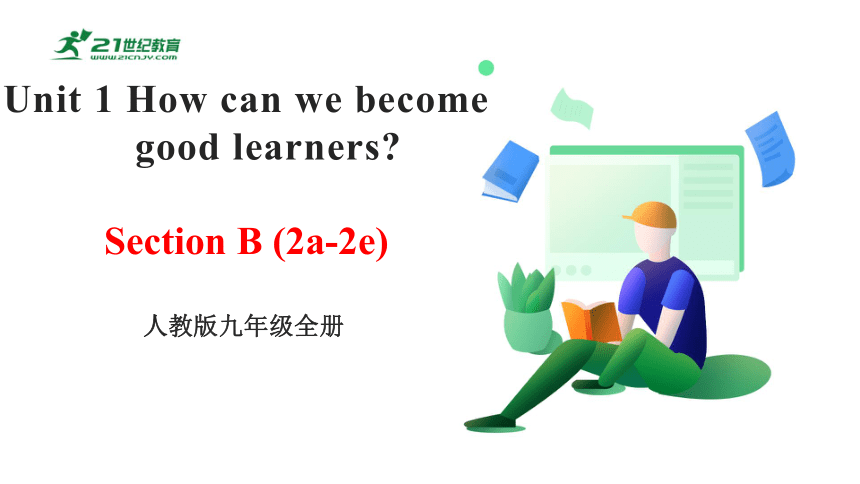
|
|
| 格式 | pptx | ||
| 文件大小 | 2.5MB | ||
| 资源类型 | 试卷 | ||
| 版本资源 | 人教新目标(Go for it)版 | ||
| 科目 | 英语 | ||
| 更新时间 | 2023-07-16 00:00:00 | ||
图片预览

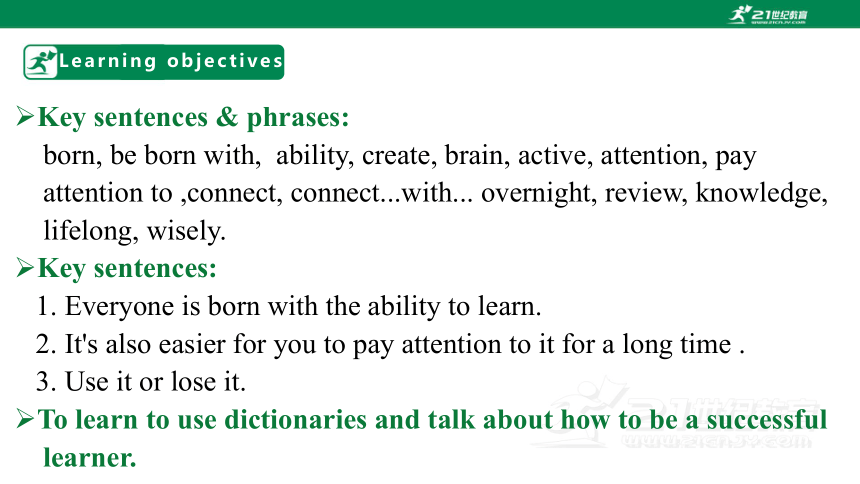
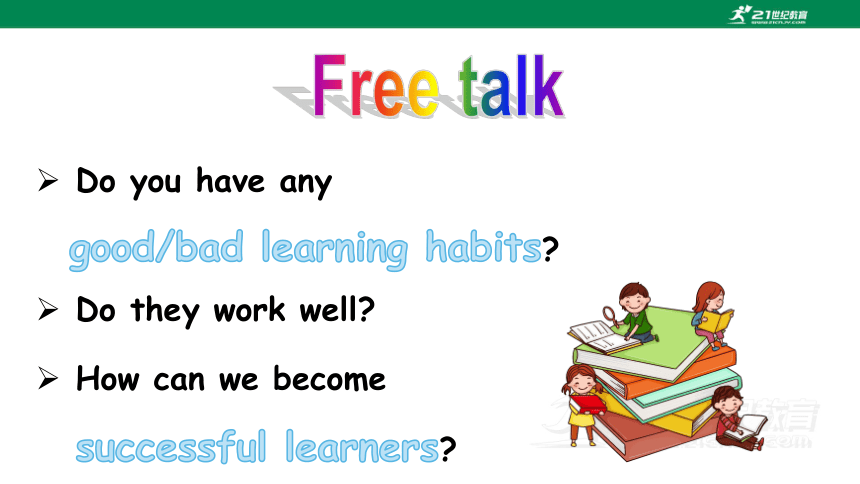
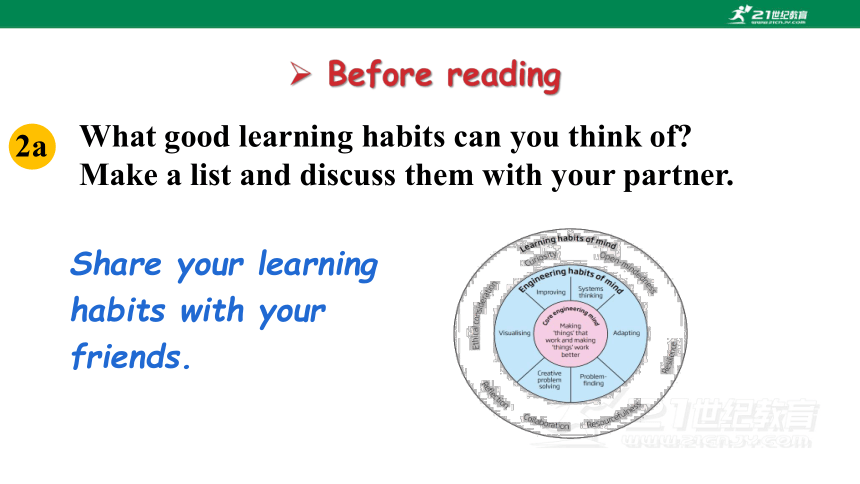
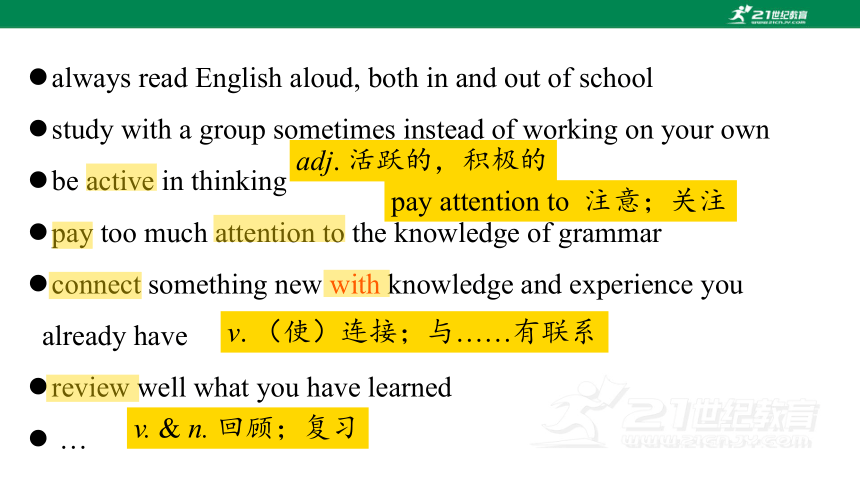
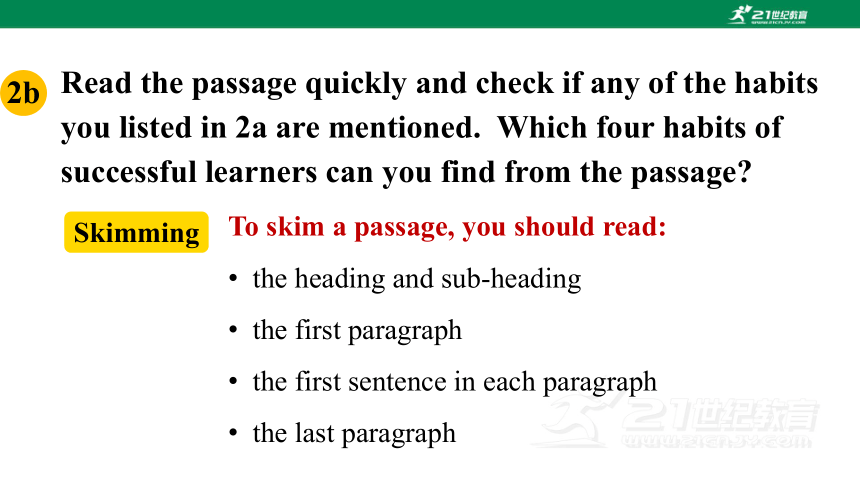
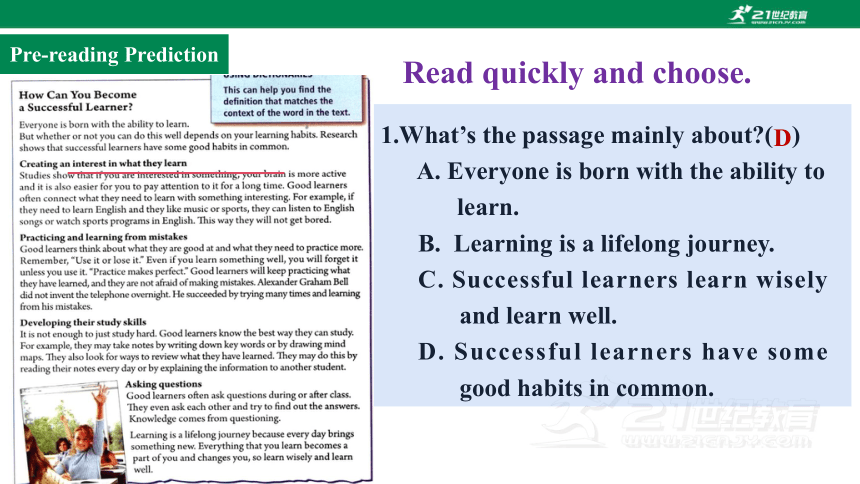
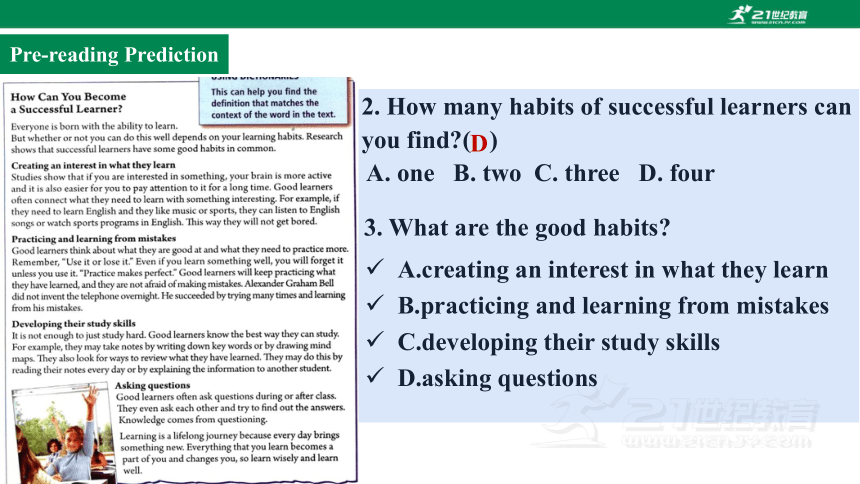
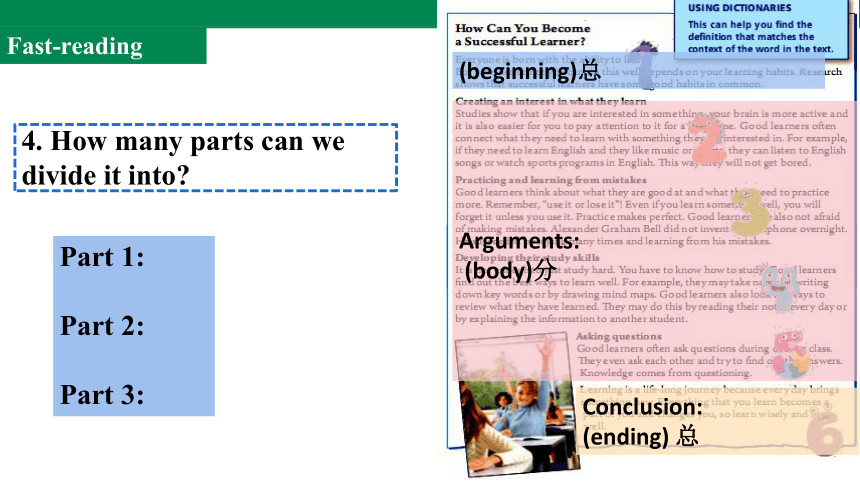
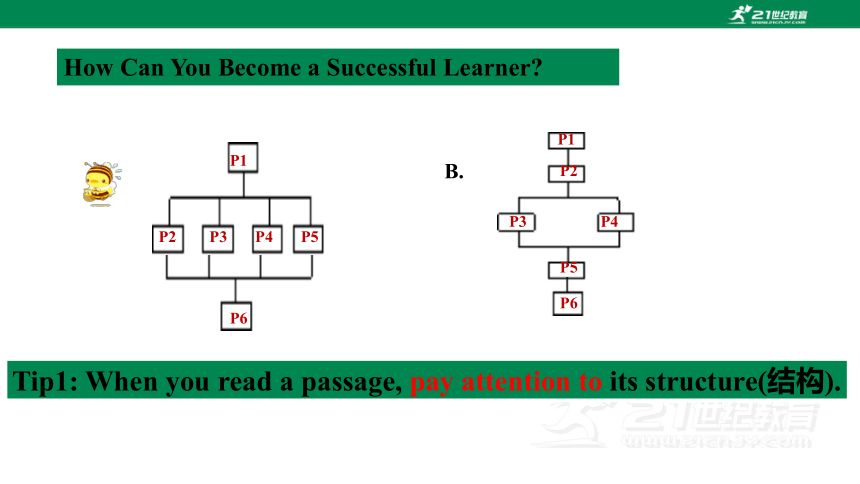
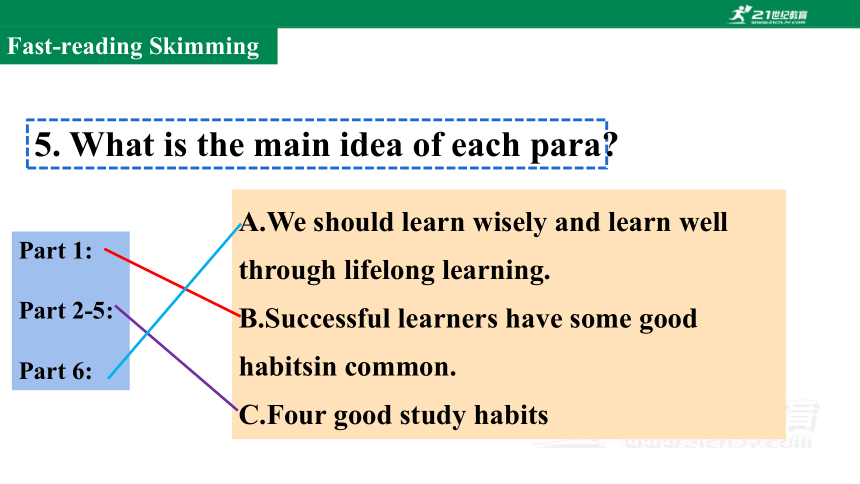
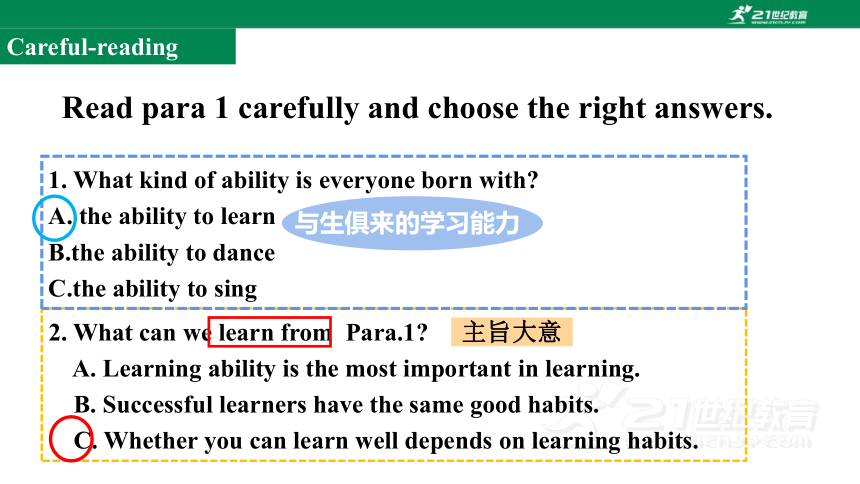
文档简介
(共57张PPT)
Unit 1 How can we become
good learners
Section B (2a-2e)
人教版九年级全册
Learning objectives
Key sentences & phrases:
born, be born with, ability, create, brain, active, attention, pay
attention to ,connect, connect...with... overnight, review, knowledge,
lifelong, wisely.
Key sentences:
1. Everyone is born with the ability to learn.
2. It's also easier for you to pay attention to it for a long time .
3. Use it or lose it.
To learn to use dictionaries and talk about how to be a successful
learner.
Free talk
Do you have any
good/bad learning habits
Do they work well
How can we become successful learners
2a
What good learning habits can you think of
Make a list and discuss them with your partner.
Share your learning habits with your friends.
Before reading
always read English aloud, both in and out of school
study with a group sometimes instead of working on your own
be active in thinking
pay too much attention to the knowledge of grammar
connect something new with knowledge and experience you
already have
review well what you have learned
…
adj. 活跃的,积极的
pay attention to 注意;关注
v. (使)连接;与……有联系
v. & n. 回顾;复习
Read the passage quickly and check if any of the habits
you listed in 2a are mentioned. Which four habits of successful learners can you find from the passage
2b
To skim a passage, you should read:
the heading and sub-heading
the first paragraph
the first sentence in each paragraph
the last paragraph
Skimming
Read quickly and choose.
1.What’s the passage mainly about ( )
A. Everyone is born with the ability to learn.
B. Learning is a lifelong journey.
C. Successful learners learn wisely and learn well.
D. Successful learners have some good habits in common.
Pre-reading Prediction
D
2. How many habits of successful learners can you find ( )
A. one B. two C. three D. four
3. What are the good habits
A.creating an interest in what they learn
B.practicing and learning from mistakes
C.developing their study skills
D.asking questions
Pre-reading Prediction
D
Fast-reading
4. How many parts can we
divide it into
Part 1:
Part 2:
Part 3:
(beginning)总
Arguments:
(body)分
Conclusion:
(ending) 总
A.
B.
How Can You Become a Successful Learner
Tip1: When you read a passage, pay attention to its structure(结构).
P1
P2
P3
P4
P5
P6
P1
P2
P3
P4
P5
P6
Fast-reading Skimming
5. What is the main idea of each para
Part 1:
Part 2-5:
Part 6:
A.We should learn wisely and learn well through lifelong learning.
B.Successful learners have some good habitsin common.
C.Four good study habits
Careful-reading
Read para 1 carefully and choose the right answers.
2. What can we learn from Para.1
A. Learning ability is the most important in learning.
B. Successful learners have the same good habits.
C. Whether you can learn well depends on learning habits.
主旨大意
1. What kind of ability is everyone born with
A. the ability to learn
B.the ability to dance
C.the ability to sing
与生俱来的学习能力
Why do successful learners create an interest in what they learn
How do successful learners create an interest in what they learn
learn English +_______ _____________________
learn English +_______ _____________________
music
sports
listen to English songs
watch sports programs in English
How does the writer prove it
more active
long
By giving examples
connect what they need to learn with sth interesting
Read para 2 carefully,answer and finish the mind map
Read para 3 carefully and choose.
1.If you are good at something, you don’t need to practice more.
T F
2.Good learners are not afraid of making mistakes, they always keep practicing.
T F
3.Alexander Graham Bell invented the telephone overnight(一夜之间). T F
didn’t invent
Read para 3 carefully and fill in the blanks.
Practicing and learning from mistakes
Example
Why?
How
_____it or
_____it
________________
______more
not be afraid
of________
__________
Alexander Graham Bell
Experiment:(成就)____________
Ways to succeed:_______________
________________________
use
lose
“ 不用则废 ”
practice
makes
prefect
“ 熟能生巧 ”
practice
making
mistakes
invented the telephone
by trying many
times and learning from mistakes
Why do successful learners develop their study skills
How do successful learners develop their study skills
study hard
best
take notes
key words
mind map
every day
explain
Read para 4 carefully,answer and finish the mind map
Why do successful learners ask questions
How do successful learners ask questions
questioning
during
each other
Read para 5 carefully,answer and finish the mind map
Read para 6 carefully and answer the questions.
Because every day brings something new.
1.Why does the writer say that learning is a lifelong journey Do you agree
2.Why should one learn wisely and learn well
Because everything that one learn becomes a part of him or her and changes him or her.
每一件你学习的事情都会变成你的一部分然后改变你。
学习是一个终身的旅程,因为每天都会带来新事物。
It is never too old to learn.
Can you think of other ways to become a successful learner Discuss with your group and share your ideas with the class.
A: I think another way to become a successful learner is by trying to think about the same thing in different ways.
B: I agree. I believe that ...
Post reading
How Can You Become a Successful Learner
Everyone is born with the ability to learn. But whether or not you can do this well depends on your learning habits. Research shows that successful learners have some good habits in common.
Creating an interest in what they learn
Studies show that if you are interested in something, your brain is more active and it is also easier for you to pay attention to it for a long time.
天生具有
have the ability to do sth be able(adj) to do sth
是否
取决于
have…in common有…共同之处
create v. 创造,创建
creation n. 创造,作品
creator n. 创造者
creativity n. 创造力,创造性
creative adj. 有创造力的
be interested in对…感兴趣= take an interest in
be active in 在某方面活跃 take an active part in 积极参与…
注意
介词,+名/代/动名词
Good learners often connect what they need to learn with something interesting. For example, if they need to learn English and they like music or sports, they can listen to English songs or watch sports programs in English. This way they will not get bored.
Practicing and learning from mistakes
Good learners think about what they are good at and what they need to practice more. Remember, “use it or lose it”!
connect…with…把…和…连接到一起
connect…to…把…连接到…上
例如
感到无聊
从...中学习
思考、考虑、认为
=do well in擅长,在某方面做的好
be good for对…有好处be good with与…相处得好
用尽废退,不用则废
Even if you learn something well, you will forget it unless you use it. “Practice makes perfect.” Good learners will keep practicing what they have learned, and they are not afraid of making mistakes. Alexander Graham Bell did not invent the telephone overnight. He succeeded by trying many times and learning from his mistakes.
=even though 即使
= if…not…
主将从现
熟能生巧
keep doing sth一直做某事
be afraid of doing sth害怕会发生某事
犯错误
succeed in doing sth成功做某事
(已经成功地做了某事)
succeed doing sth办到,成功(还未开始做)
success n. 成功,胜利,发财,成功的人或事物
successful adj.成功的
successfully adv.成功地
keep on doing sth继续做某事(动作之间有间隔)
keep sb from doing sth阻止某人做某事
keep+adj 保持…样/状态
Developing their study skills
It is not enough to just study hard. Good learners know the best ways they can study. For example, they may take notes by writing down key words or by drawing mind maps. They also look for ways to review what they have learned. They may do this by reading their notes every day or by explaining the information to another student.
v.发展,培养 n. Development发展
It is + adj + to do sth
记下,写下
思维导图
寻找
explain sth to sb
向某人解释某事
Asking questions
Good learners often ask questions during or after class. They even ask each other and try to find out the answers. Knowledge comes from questioning.
Learning is a lifelong journey because every day
brings something new. Everything that
you learn becomes a part of you
and changes you, so learn wisely and learn well.
=one another
找出,查明,弄清
v.质疑,提问
定语从句
…的一部分
wise adj. 明智的 wisdom n. 智慧,学问,才智
2c
Read the passage again and answer the questions.
1. Does the writer think that everyone is born with the ability to learn well Do you agree Why or why not
No, he doesn’t.
No, I disagree.
Because whether or not you can do this well depends on your learning habits.
2. Why is it a good idea to connect something you need to learn with something you are interested in
This is because studies show that if you are interested in something, your brain is more active and it is easier for you to pay attention to it for a long time. You will not also get bored.
3. What do the sayings “use it or lose it” and “practice makes perfect” mean Do you agree with them
Use it or lose it: If you stop doing something, you will forget
how to do it.
Practice makes perfect: If you do something again and again, you
will become very good at it.
Yes, I do.
4. Do good learners learn from mistakes or are they afraid of making mistakes
They learn from mistakes, and they are not afraid of making mistakes.
5. What study skills does the writer talk about Do you have those study skills
Take notes by writing down key words or by drawing mind maps.
Look for ways to review what they have learned, for example, read their notes every day or explain the information to another student.
6. Do you agree that learning is a lifelong journey
Why or why not
Yes, I do. Because every day brings something new.
2d
Look up the following words from the passage in the dictionary. Then write a sentence for each word.
brain n. connect v. overnight adv.
attention n. review v. knowledge n.
ability n. active adj. wisely adv.
e.g. brain: A good way to train the brain is to do some math exercises every day.
2. Draw a line to connect these two points.
3. Don’t expect to learn a new skill overnight.
4. It is important to pay attention in class.
5. At the end of every day, I try to review the new words I learned that day.
6. Learning a new language also helps us to gain some knowledge of the culture of its native speakers.
7. Scientists believe that only humans have the ability to learn a complex language.
8. My brother is active and he enjoys sports.
9. Her mother wisely advised her not to give up studying English.
2e
Do you think you are a good learner What learning habits do you think are useful Discuss with your group and share your ideas with the class.
A: I think I am a good learner. The useful learning
habit is trying to think about the same thing in
different ways.
B: I agree. It’s important to...
Group work
Useful learning habits Reason
asking questions ……
…..
In my group, we think the following learning habits are useful.
First, we should_________________, because______________.
Second, ________________________________________________
_______________________________________________________
_______________________________________________________
_______________________________________________________.
Just learn wisely and learn well.
1. Everyone is born with the ability to learn.(教材P6 )
Language Points
born v. 出生;adj. 天生的 作“天生的”讲只能用于名词前作定语
He is a born leader. 他是个天生的领袖。
She was born with the ability to swim. 她天生具有游泳的才能。
He was born in Ji’nan in 2008. 2008 年他出生在济南。
She was born on October 1st. 她出生在十月一号。
be born in +地点或非具体日期
be born with 天生具有
be born on + 具体日期
2. Creating an interest in what they learn(教材P6)
create v. 创造;创建 相关词汇:
creation n . 创造
creator n . 创造者
creative adj . 有创造力的
e.g. Shakespeare created many famous characters.
莎士比亚创造了许多著名的角色。
辨析:create, discover 与invent
create 产生;创造 指创造出原来并不存在的东西,其对象往往是精神上的,如艺术、文学作品中的人物及新的学科领域等。也指创造出新的具体事物。
discover 发现 某种自然界本来已经存在,但以前未被人类发现或认识的事物,如发现元素、电、煤等以及新星、星系等。
invent 发明;创造 指创造出自然界原来并不存在的东西,其对象
往往是物质性的,尤指科技上的发明创造,如
工具、方法、汽车、合成材料等。
Jim has created some new songs.
The man discovered some jewels in the box.
Edison invented the electric light bulb.
3. Studies show that if you are interested in something, your brain is more active and it is also easier for you to pay attention to it for a long time. (教材P6)
active adj. 活跃的;积极的 相关词汇:
activity n . 活动
actively adv .活跃地;积极地
e.g. John is an active member of the club. He always takes part in kinds of activities
约翰是这个俱乐部的一名积极会员。他总是参加各种活动。
pay attention to 注意;关注 to为介词, 后接名词、代词、动词的-ing形式或从句,短语中的attention 前可以加no, more等修饰词,意为“没有注意或多加注意”。
e.g. We must pay attention to keeping the room clean.
我们必须注意保持房间干净。
Attention, please! 请注意!
4. Good learners often connect what they need to learn with something interesting.(教材P6)
connect v.(使)连接;与……有联系,connect的名词形式是connection。 常用结构:
connect... to/with... 把……和……相连接;
connect… with...还可表示“把......和…...联系起来”;
You can connect the speaker to the CD player.
你可以把扬声器连接带激光唱机上。
This railway line connects London with Edinburgh.
这条铁路连接伦敦和爱丁堡。
What is the connection between the two ideas
这两个想法之间有何联系?
5. Even if you learn something well, you will forget it unless you use it.(教材P6)
even if 即使,引导让步状语从句。
e.g. Even if he was ill, he kept on working.
即使他病了,他仍坚持工作。
even if = even though = though = although意为“尽管;即使”, 且这四个词不能与but同用在一个句子中。
unless 除非;如果不 引导条件状语从句 相当于 if ... not 在unless引导的条件状语从句中如果主句用一般将来时, 则从句用一般现在时。
e.g. You will fail the exam unless you work hard.
= You will fail the exam if you don’t work hard.
如果你不努力学习,你将考试不及格。
6. Good learners will keep practicing what they have learned, and they are not afraid of making mistakes.(教材P6)
keep doing sth. 一直做某事;继续做某事
e.g. Keep working hard, and you will succeed.
坚持努力学习,你就会成功。
Don’t keep on making mistakes. 不要反复出错。
keep on doing sth.反复做某事
The heavy snow kept us from going ahead.
大雪阻止我们向前进。
Please keep quiet. 请保持安静。
We must keep our classroom clean every day.
每天我们必须保持教室干净。
keep sb. from doing sth.
阻止某人做某事
keep + adj . 保持怎么样
keep + 宾语+ adj .保持某物怎么样
7. He succeeded by trying many times and learning from his mistakes.(教材P6)
succeed v. 成功
succeed(in)doing sth. 成功做某事
e.g. In the end we succeeded (in) reaching the top.
最后我们成功登顶。
相关词汇:success(n. 成功) successful(adj . 成功的)
successfully(adv .成功地)
knowledge常用作不可数名词。但有时可用a knowledge,常与介词of或 about 连用,表示“…...方面的知识”。
Knowledge is power. 知识就是力量。
He has a wide knowledge of painting and music.
他在绘画和音乐方面知识渊博。
8. Knowledge comes from questioning.(教材P6 )
Summary
Exercises
一、单选
一 How are you getting on with your cousin
一 Very well. He is really ________ and joins in all kinds of activities in his
spare time.
A. shy B. active C. patient D. careful
2. 一 Li Mei has improved her English a lot since she joined the English club.
一 How ______ she chose to join it at first!
A. quickly B. wisely C. simply D. suddenly
B
B
3. You need to pay attention to ________ as much as possible.
A. speaking B. speak C. speaks D. spoken
4. The poor boy was born _______ a weak heart. We’re going to raise money for
him next week.
A. in B. by C. on D. with
5. A good student connects what he reads _____ what he sees around him.
A. for B. with C. in D. on
A
D
B
1.他虽然天生弱视,但仍怀有大梦想。
He __________________weak eyesight, but he still has a big dream.
2. 一个人必须有与他人合作的能力。
One must have the ___________to work with others.
3. 让我们采取行动,创建低碳社会。
Let's take action and _________a low-carbon society.
4. 多动动脑子。
Use your ___________ a lot.
5. 同学们积极参与了这次比赛。
The students took an __________part in the competition.
was born with
ability
create
brain
二、根据汉语意思完成句子。
active
6. 请注意!/请大家听我说,好吗?
May I have your _____________, please
7. 你得多注意饮食。
You have to ___________________________your diet.
8. 我的电脑连不上网。
I can't __________my computer _______the Internet.
9. 所有的学生都求知若渴。
All the students are thirsty for _______________.
10. 做事匆忙,就会出错。
You will _________________ if you do things in a hurry.
attention
pay more attention to
connect with
knowledge
make mistakes
Homework
1.Remember the words and phrases in this lesson.
2. Do the exercises in students’ book.
谢谢
21世纪教育网(www.21cnjy.com)
中小学教育资源网站
兼职招聘:
https://www.21cnjy.com/recruitment/home/admin
Unit 1 How can we become
good learners
Section B (2a-2e)
人教版九年级全册
Learning objectives
Key sentences & phrases:
born, be born with, ability, create, brain, active, attention, pay
attention to ,connect, connect...with... overnight, review, knowledge,
lifelong, wisely.
Key sentences:
1. Everyone is born with the ability to learn.
2. It's also easier for you to pay attention to it for a long time .
3. Use it or lose it.
To learn to use dictionaries and talk about how to be a successful
learner.
Free talk
Do you have any
good/bad learning habits
Do they work well
How can we become successful learners
2a
What good learning habits can you think of
Make a list and discuss them with your partner.
Share your learning habits with your friends.
Before reading
always read English aloud, both in and out of school
study with a group sometimes instead of working on your own
be active in thinking
pay too much attention to the knowledge of grammar
connect something new with knowledge and experience you
already have
review well what you have learned
…
adj. 活跃的,积极的
pay attention to 注意;关注
v. (使)连接;与……有联系
v. & n. 回顾;复习
Read the passage quickly and check if any of the habits
you listed in 2a are mentioned. Which four habits of successful learners can you find from the passage
2b
To skim a passage, you should read:
the heading and sub-heading
the first paragraph
the first sentence in each paragraph
the last paragraph
Skimming
Read quickly and choose.
1.What’s the passage mainly about ( )
A. Everyone is born with the ability to learn.
B. Learning is a lifelong journey.
C. Successful learners learn wisely and learn well.
D. Successful learners have some good habits in common.
Pre-reading Prediction
D
2. How many habits of successful learners can you find ( )
A. one B. two C. three D. four
3. What are the good habits
A.creating an interest in what they learn
B.practicing and learning from mistakes
C.developing their study skills
D.asking questions
Pre-reading Prediction
D
Fast-reading
4. How many parts can we
divide it into
Part 1:
Part 2:
Part 3:
(beginning)总
Arguments:
(body)分
Conclusion:
(ending) 总
A.
B.
How Can You Become a Successful Learner
Tip1: When you read a passage, pay attention to its structure(结构).
P1
P2
P3
P4
P5
P6
P1
P2
P3
P4
P5
P6
Fast-reading Skimming
5. What is the main idea of each para
Part 1:
Part 2-5:
Part 6:
A.We should learn wisely and learn well through lifelong learning.
B.Successful learners have some good habitsin common.
C.Four good study habits
Careful-reading
Read para 1 carefully and choose the right answers.
2. What can we learn from Para.1
A. Learning ability is the most important in learning.
B. Successful learners have the same good habits.
C. Whether you can learn well depends on learning habits.
主旨大意
1. What kind of ability is everyone born with
A. the ability to learn
B.the ability to dance
C.the ability to sing
与生俱来的学习能力
Why do successful learners create an interest in what they learn
How do successful learners create an interest in what they learn
learn English +_______ _____________________
learn English +_______ _____________________
music
sports
listen to English songs
watch sports programs in English
How does the writer prove it
more active
long
By giving examples
connect what they need to learn with sth interesting
Read para 2 carefully,answer and finish the mind map
Read para 3 carefully and choose.
1.If you are good at something, you don’t need to practice more.
T F
2.Good learners are not afraid of making mistakes, they always keep practicing.
T F
3.Alexander Graham Bell invented the telephone overnight(一夜之间). T F
didn’t invent
Read para 3 carefully and fill in the blanks.
Practicing and learning from mistakes
Example
Why?
How
_____it or
_____it
________________
______more
not be afraid
of________
__________
Alexander Graham Bell
Experiment:(成就)____________
Ways to succeed:_______________
________________________
use
lose
“ 不用则废 ”
practice
makes
prefect
“ 熟能生巧 ”
practice
making
mistakes
invented the telephone
by trying many
times and learning from mistakes
Why do successful learners develop their study skills
How do successful learners develop their study skills
study hard
best
take notes
key words
mind map
every day
explain
Read para 4 carefully,answer and finish the mind map
Why do successful learners ask questions
How do successful learners ask questions
questioning
during
each other
Read para 5 carefully,answer and finish the mind map
Read para 6 carefully and answer the questions.
Because every day brings something new.
1.Why does the writer say that learning is a lifelong journey Do you agree
2.Why should one learn wisely and learn well
Because everything that one learn becomes a part of him or her and changes him or her.
每一件你学习的事情都会变成你的一部分然后改变你。
学习是一个终身的旅程,因为每天都会带来新事物。
It is never too old to learn.
Can you think of other ways to become a successful learner Discuss with your group and share your ideas with the class.
A: I think another way to become a successful learner is by trying to think about the same thing in different ways.
B: I agree. I believe that ...
Post reading
How Can You Become a Successful Learner
Everyone is born with the ability to learn. But whether or not you can do this well depends on your learning habits. Research shows that successful learners have some good habits in common.
Creating an interest in what they learn
Studies show that if you are interested in something, your brain is more active and it is also easier for you to pay attention to it for a long time.
天生具有
have the ability to do sth be able(adj) to do sth
是否
取决于
have…in common有…共同之处
create v. 创造,创建
creation n. 创造,作品
creator n. 创造者
creativity n. 创造力,创造性
creative adj. 有创造力的
be interested in对…感兴趣= take an interest in
be active in 在某方面活跃 take an active part in 积极参与…
注意
介词,+名/代/动名词
Good learners often connect what they need to learn with something interesting. For example, if they need to learn English and they like music or sports, they can listen to English songs or watch sports programs in English. This way they will not get bored.
Practicing and learning from mistakes
Good learners think about what they are good at and what they need to practice more. Remember, “use it or lose it”!
connect…with…把…和…连接到一起
connect…to…把…连接到…上
例如
感到无聊
从...中学习
思考、考虑、认为
=do well in擅长,在某方面做的好
be good for对…有好处be good with与…相处得好
用尽废退,不用则废
Even if you learn something well, you will forget it unless you use it. “Practice makes perfect.” Good learners will keep practicing what they have learned, and they are not afraid of making mistakes. Alexander Graham Bell did not invent the telephone overnight. He succeeded by trying many times and learning from his mistakes.
=even though 即使
= if…not…
主将从现
熟能生巧
keep doing sth一直做某事
be afraid of doing sth害怕会发生某事
犯错误
succeed in doing sth成功做某事
(已经成功地做了某事)
succeed doing sth办到,成功(还未开始做)
success n. 成功,胜利,发财,成功的人或事物
successful adj.成功的
successfully adv.成功地
keep on doing sth继续做某事(动作之间有间隔)
keep sb from doing sth阻止某人做某事
keep+adj 保持…样/状态
Developing their study skills
It is not enough to just study hard. Good learners know the best ways they can study. For example, they may take notes by writing down key words or by drawing mind maps. They also look for ways to review what they have learned. They may do this by reading their notes every day or by explaining the information to another student.
v.发展,培养 n. Development发展
It is + adj + to do sth
记下,写下
思维导图
寻找
explain sth to sb
向某人解释某事
Asking questions
Good learners often ask questions during or after class. They even ask each other and try to find out the answers. Knowledge comes from questioning.
Learning is a lifelong journey because every day
brings something new. Everything that
you learn becomes a part of you
and changes you, so learn wisely and learn well.
=one another
找出,查明,弄清
v.质疑,提问
定语从句
…的一部分
wise adj. 明智的 wisdom n. 智慧,学问,才智
2c
Read the passage again and answer the questions.
1. Does the writer think that everyone is born with the ability to learn well Do you agree Why or why not
No, he doesn’t.
No, I disagree.
Because whether or not you can do this well depends on your learning habits.
2. Why is it a good idea to connect something you need to learn with something you are interested in
This is because studies show that if you are interested in something, your brain is more active and it is easier for you to pay attention to it for a long time. You will not also get bored.
3. What do the sayings “use it or lose it” and “practice makes perfect” mean Do you agree with them
Use it or lose it: If you stop doing something, you will forget
how to do it.
Practice makes perfect: If you do something again and again, you
will become very good at it.
Yes, I do.
4. Do good learners learn from mistakes or are they afraid of making mistakes
They learn from mistakes, and they are not afraid of making mistakes.
5. What study skills does the writer talk about Do you have those study skills
Take notes by writing down key words or by drawing mind maps.
Look for ways to review what they have learned, for example, read their notes every day or explain the information to another student.
6. Do you agree that learning is a lifelong journey
Why or why not
Yes, I do. Because every day brings something new.
2d
Look up the following words from the passage in the dictionary. Then write a sentence for each word.
brain n. connect v. overnight adv.
attention n. review v. knowledge n.
ability n. active adj. wisely adv.
e.g. brain: A good way to train the brain is to do some math exercises every day.
2. Draw a line to connect these two points.
3. Don’t expect to learn a new skill overnight.
4. It is important to pay attention in class.
5. At the end of every day, I try to review the new words I learned that day.
6. Learning a new language also helps us to gain some knowledge of the culture of its native speakers.
7. Scientists believe that only humans have the ability to learn a complex language.
8. My brother is active and he enjoys sports.
9. Her mother wisely advised her not to give up studying English.
2e
Do you think you are a good learner What learning habits do you think are useful Discuss with your group and share your ideas with the class.
A: I think I am a good learner. The useful learning
habit is trying to think about the same thing in
different ways.
B: I agree. It’s important to...
Group work
Useful learning habits Reason
asking questions ……
…..
In my group, we think the following learning habits are useful.
First, we should_________________, because______________.
Second, ________________________________________________
_______________________________________________________
_______________________________________________________
_______________________________________________________.
Just learn wisely and learn well.
1. Everyone is born with the ability to learn.(教材P6 )
Language Points
born v. 出生;adj. 天生的 作“天生的”讲只能用于名词前作定语
He is a born leader. 他是个天生的领袖。
She was born with the ability to swim. 她天生具有游泳的才能。
He was born in Ji’nan in 2008. 2008 年他出生在济南。
She was born on October 1st. 她出生在十月一号。
be born in +地点或非具体日期
be born with 天生具有
be born on + 具体日期
2. Creating an interest in what they learn(教材P6)
create v. 创造;创建 相关词汇:
creation n . 创造
creator n . 创造者
creative adj . 有创造力的
e.g. Shakespeare created many famous characters.
莎士比亚创造了许多著名的角色。
辨析:create, discover 与invent
create 产生;创造 指创造出原来并不存在的东西,其对象往往是精神上的,如艺术、文学作品中的人物及新的学科领域等。也指创造出新的具体事物。
discover 发现 某种自然界本来已经存在,但以前未被人类发现或认识的事物,如发现元素、电、煤等以及新星、星系等。
invent 发明;创造 指创造出自然界原来并不存在的东西,其对象
往往是物质性的,尤指科技上的发明创造,如
工具、方法、汽车、合成材料等。
Jim has created some new songs.
The man discovered some jewels in the box.
Edison invented the electric light bulb.
3. Studies show that if you are interested in something, your brain is more active and it is also easier for you to pay attention to it for a long time. (教材P6)
active adj. 活跃的;积极的 相关词汇:
activity n . 活动
actively adv .活跃地;积极地
e.g. John is an active member of the club. He always takes part in kinds of activities
约翰是这个俱乐部的一名积极会员。他总是参加各种活动。
pay attention to 注意;关注 to为介词, 后接名词、代词、动词的-ing形式或从句,短语中的attention 前可以加no, more等修饰词,意为“没有注意或多加注意”。
e.g. We must pay attention to keeping the room clean.
我们必须注意保持房间干净。
Attention, please! 请注意!
4. Good learners often connect what they need to learn with something interesting.(教材P6)
connect v.(使)连接;与……有联系,connect的名词形式是connection。 常用结构:
connect... to/with... 把……和……相连接;
connect… with...还可表示“把......和…...联系起来”;
You can connect the speaker to the CD player.
你可以把扬声器连接带激光唱机上。
This railway line connects London with Edinburgh.
这条铁路连接伦敦和爱丁堡。
What is the connection between the two ideas
这两个想法之间有何联系?
5. Even if you learn something well, you will forget it unless you use it.(教材P6)
even if 即使,引导让步状语从句。
e.g. Even if he was ill, he kept on working.
即使他病了,他仍坚持工作。
even if = even though = though = although意为“尽管;即使”, 且这四个词不能与but同用在一个句子中。
unless 除非;如果不 引导条件状语从句 相当于 if ... not 在unless引导的条件状语从句中如果主句用一般将来时, 则从句用一般现在时。
e.g. You will fail the exam unless you work hard.
= You will fail the exam if you don’t work hard.
如果你不努力学习,你将考试不及格。
6. Good learners will keep practicing what they have learned, and they are not afraid of making mistakes.(教材P6)
keep doing sth. 一直做某事;继续做某事
e.g. Keep working hard, and you will succeed.
坚持努力学习,你就会成功。
Don’t keep on making mistakes. 不要反复出错。
keep on doing sth.反复做某事
The heavy snow kept us from going ahead.
大雪阻止我们向前进。
Please keep quiet. 请保持安静。
We must keep our classroom clean every day.
每天我们必须保持教室干净。
keep sb. from doing sth.
阻止某人做某事
keep + adj . 保持怎么样
keep + 宾语+ adj .保持某物怎么样
7. He succeeded by trying many times and learning from his mistakes.(教材P6)
succeed v. 成功
succeed(in)doing sth. 成功做某事
e.g. In the end we succeeded (in) reaching the top.
最后我们成功登顶。
相关词汇:success(n. 成功) successful(adj . 成功的)
successfully(adv .成功地)
knowledge常用作不可数名词。但有时可用a knowledge,常与介词of或 about 连用,表示“…...方面的知识”。
Knowledge is power. 知识就是力量。
He has a wide knowledge of painting and music.
他在绘画和音乐方面知识渊博。
8. Knowledge comes from questioning.(教材P6 )
Summary
Exercises
一、单选
一 How are you getting on with your cousin
一 Very well. He is really ________ and joins in all kinds of activities in his
spare time.
A. shy B. active C. patient D. careful
2. 一 Li Mei has improved her English a lot since she joined the English club.
一 How ______ she chose to join it at first!
A. quickly B. wisely C. simply D. suddenly
B
B
3. You need to pay attention to ________ as much as possible.
A. speaking B. speak C. speaks D. spoken
4. The poor boy was born _______ a weak heart. We’re going to raise money for
him next week.
A. in B. by C. on D. with
5. A good student connects what he reads _____ what he sees around him.
A. for B. with C. in D. on
A
D
B
1.他虽然天生弱视,但仍怀有大梦想。
He __________________weak eyesight, but he still has a big dream.
2. 一个人必须有与他人合作的能力。
One must have the ___________to work with others.
3. 让我们采取行动,创建低碳社会。
Let's take action and _________a low-carbon society.
4. 多动动脑子。
Use your ___________ a lot.
5. 同学们积极参与了这次比赛。
The students took an __________part in the competition.
was born with
ability
create
brain
二、根据汉语意思完成句子。
active
6. 请注意!/请大家听我说,好吗?
May I have your _____________, please
7. 你得多注意饮食。
You have to ___________________________your diet.
8. 我的电脑连不上网。
I can't __________my computer _______the Internet.
9. 所有的学生都求知若渴。
All the students are thirsty for _______________.
10. 做事匆忙,就会出错。
You will _________________ if you do things in a hurry.
attention
pay more attention to
connect with
knowledge
make mistakes
Homework
1.Remember the words and phrases in this lesson.
2. Do the exercises in students’ book.
谢谢
21世纪教育网(www.21cnjy.com)
中小学教育资源网站
兼职招聘:
https://www.21cnjy.com/recruitment/home/admin
同课章节目录
- Unit 1 How can we become good learners.
- Section A
- Section B
- Unit 2 I think that mooncakes are delicious!
- Section A
- Section B
- Unit 3 Could you please tell me where the restroom
- Section A
- Section B
- Unit 4 I used to be afraid of the dark.
- Section A
- Section B
- Unit 5 What are the shirts made of?
- Section A
- Section B
- Review of Units 1-5
- Unit 6 When was it invented?
- Section A
- Section B
- Unit 7 Teenagers should be allowed to choose their
- Section A
- Section B
- Unit 8 It must belong to Carla.
- Section A
- Section B
- Unit 9 I like music that I can dance to.
- Section A
- Section B
- Unit 10 You're supposed to shake hands.
- Section A
- Section B
- Review of Units 6-10
- Unit 11 Sad movies make me cry.
- Section A
- Section B
- Unit 12 Life is full of the unexpected
- Section A
- Section B
- Unit 13 We're trying to save the earth!
- Section A
- Section B
- Unit 14 I remember meeting all of you in Grade 7.
- Section A
- Section B
- Review of Units 11-14
